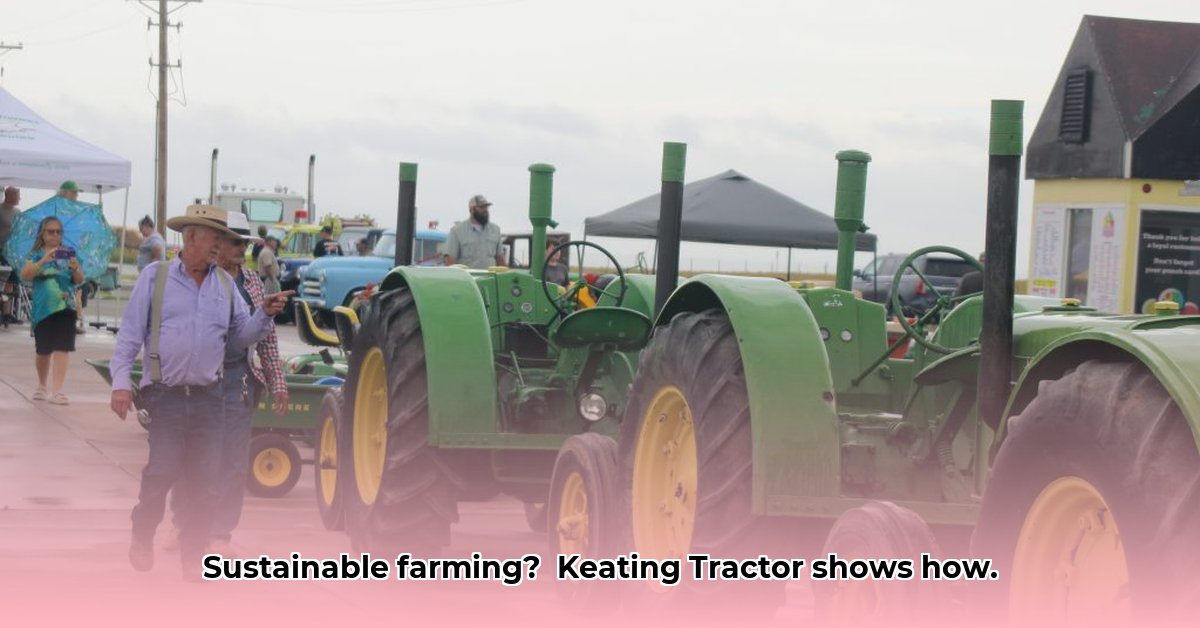
Keating Tractor's Legacy: A History of Service in Kansas Agriculture
Keating Tractor, a Liberal, Kansas institution for over 60 years, stands as more than just a farm equipment dealership. It's a cornerstone of the community, deeply rooted in the local agricultural landscape. Generations of farmers have relied on Keating for reliable equipment and expert advice – a testament to their unwavering commitment to customer service. Their long-standing presence reflects not merely successful sales, but enduring relationships built on trust and mutual success. This deep-rooted history underpins their credibility and commitment to supporting the evolution of farming in Kansas. Their longevity is a reflection of their adaptability and understanding of the evolving needs of Kansas farmers. For more Kansas agricultural resources, check out this helpful website.
Sustainable Agriculture: A Necessary Evolution
Modern agriculture is evolving beyond maximizing yields to encompass responsible land management and resource conservation. Sustainable agriculture necessitates a delicate balance—producing sufficient food while minimizing environmental impact. This requires strategic planning, efficient technology utilization, and a prioritization of soil health. It's a forward-thinking approach, ensuring the long-term health of our planet and the viability of future harvests. How can farmers navigate this challenge while remaining profitable?
John Deere: Technological Advancements for a Sustainable Future
John Deere, a leader in agricultural innovation, is actively driving sustainable farming practices through technological advancements. Their commitment is evident in the development of precision farming tools such as GPS-guided tractors for precise planting and fertilizer application, and fuel-efficient engines that reduce greenhouse gas emissions. These technologies not only boost efficiency and minimize waste but also contribute to environmental protection. This commitment is further reinforced by Deere's own published sustainability reports [1], detailing their progress and future ambitions. How does this translate into practical solutions for Kansas farmers?
Keating's Role in Empowering Sustainable Practices
Keating Tractor plays a pivotal role in facilitating the adoption of sustainable practices among Kansas farmers. Their access to John Deere's cutting-edge technology, coupled with their long-standing reputation for expert support and training, positions them uniquely to guide farmers toward environmental responsibility. They provide not only equipment but also the knowledge and resources necessary for successful implementation. While specific details of their sustainability initiatives require further research, their established history of commitment to their customers suggests a proactive approach to supporting this critical shift. What practical steps can farmers take, both with and without Keating's assistance?
Actionable Steps for Sustainable Farming
Farmers can implement sustainable practices independently or with Keating Tractor's support. These key steps offer a practical pathway to a more environmentally conscious approach:
Conduct a Farm Audit: Begin by assessing your current operations to pinpoint areas for resource optimization. This crucial first step allows for targeted improvements in resource management.
Embrace Precision Agriculture: Utilize GPS-guided technology for precise planting, fertilization, and pesticide application, minimizing waste and maximizing yields. This data-driven approach increases efficiency and reduces environmental impact.
Invest in Fuel-Efficient Equipment: Upgrading to newer, more fuel-efficient machinery offers long-term cost savings and reduces your carbon footprint. The long-term savings often offset the initial investment.
Prioritize Soil Health: Implement soil-enhancing practices like cover cropping and no-till farming, improving soil structure and promoting nutrient retention. Healthy soil is fundamental to sustainable agriculture.
Diversify Your Crops: Rotating crops helps maintain soil fertility, reduces pest and disease pressure, and minimizes risks associated with monocultures. Diversity builds resilience and reduces environmental vulnerability.
Challenges and Long-Term Rewards of Sustainable Agriculture
The transition to sustainable agriculture involves challenges. Initial investments in new technologies and the learning curve associated with new practices can seem daunting. However, the long-term rewards—improved soil health, reduced environmental impact, and potential cost savings—significantly outweigh these hurdles. Furthermore, a growing market demand for sustainably produced crops presents a strong economic incentive. Are these long-term benefits sufficient to overcome initial investment barriers?
Conclusion: A Collaborative Future for Sustainable Agriculture
The future of agriculture hinges on collaboration. Strong partnerships among dealerships like Keating Tractor, farmers, equipment manufacturers, and governmental agencies are vital for a successful transition to sustainable farming. By combining the expertise of experienced dealerships like Keating with the dedication and innovation of farmers, we can create a more environmentally friendly and economically resilient agricultural system, ensuring a prosperous future for the Kansas farming community and beyond. The collaborative effort is crucial, paving the way towards a more sustainable and prosperous agricultural landscape.
[1]: [Link to John Deere Sustainability Report - Replace with actual link]